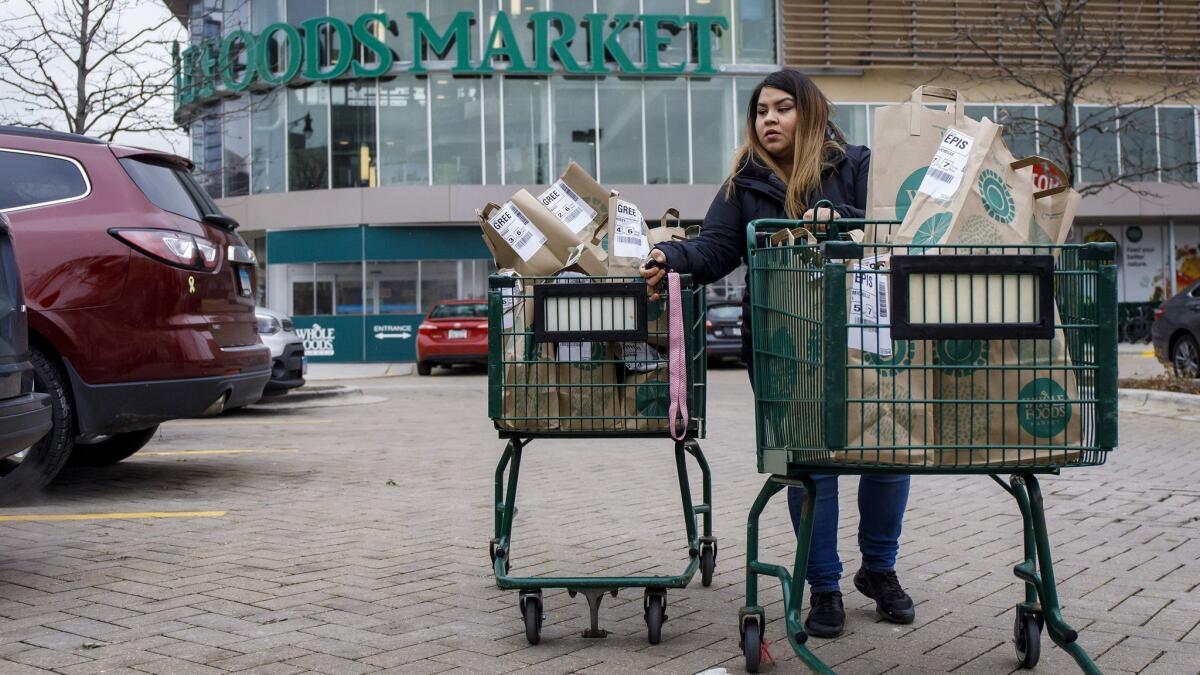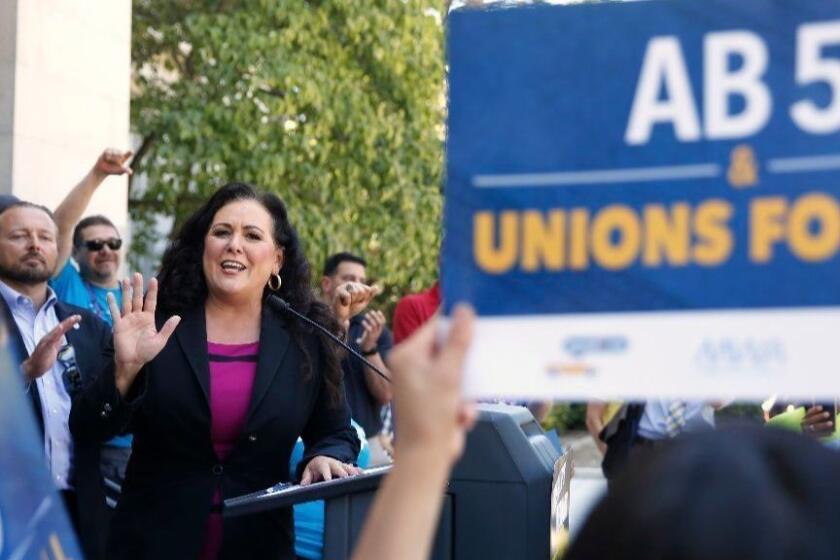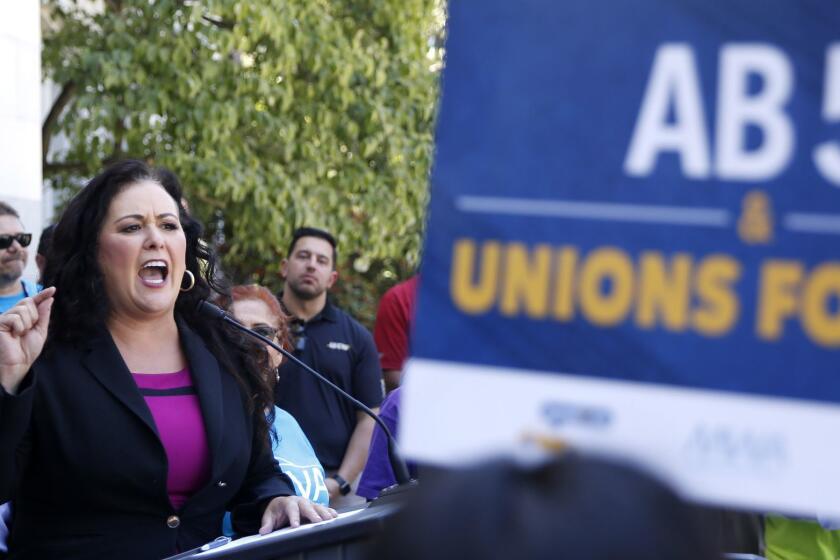Column: Gig firm Instacart, facing revolt by its workers, joins Uber’s campaign to reduce pay

- Share via
The gig economy firms Uber and Lyft have acknowledged that their business model is based on treating their workers as independent contractors, not employees. But when it comes to exploiting its front-line workers, the grocery delivery service Instacart may be in a class by itself.
At least, that’s the conclusion one could draw from the gig company’s history of worker relations. Instacart, which relies on non-employees to assemble supermarket baskets on order and deliver them to customers, is currently undergoing a worker walkout for the fourth year in a row.
The walkout, which began Sunday and will run through Tuesday, is a protest against an Instacart policy that workers say shortchanges them on tips.
Meanwhile, an open letter published Nov. 1 and signed by 212 of the company’s “shoppers” — the workers who assemble the orders and sometimes make deliveries too — excoriates Instacart founder and Chief Executive Apoorva Mehta for his “well-documented history of unscrupulous actions against Instacart’s Shoppers.”
You have demonstrated a pattern of behavior as CEO of eviscerating our pay and pirating our tips.
— Instacart workers’ letter to CEO Apoorva Mehta
These include efforts to divert tips into corporate coffers and changes to pay formulas that some shoppers say have dramatically slashed their income.
In the face of all this discontent, Instacart joined a campaign to overturn California’s new gig economy law via an initiative to appear on the November 2020 state ballot. The company contributed $10 million to the ballot campaign, which was launched at the end of October with $90 million in funding from Uber, Lyft and DoorDash. Postmates, another app-based delivery firm, also has contributed $10 million.
“Shoppers have very little trust and very little respect for Apoorva Mehta, unfortunately,” says Vanessa Bain, 33, an organizer of this year’s walkout. “So many times they’ve said they would do better” for the shoppers and drivers, “and proceeded to do worse.”
Uber, Lyft and Doordash will spend $90 million to undercut a California employment law.
Instacart wouldn’t say whether it will change its payment policy in response to the latest walkout. “We take the feedback of the shopper community very seriously and remain committed to listening to and using that feedback to improve their experience,” the company told me by email. It said it is supporting the 2020 ballot measure “to protect the rights of on-demand rideshare and delivery drivers to choose flexible work as independent contractors.”
The company also says it doesn’t expect the walkout to cause any disruption to customer orders.
The conflicts between Instacart and its workers are emblematic of the issues bedeviling gig firms generally, especially those that connect customers and workers via computer or smartphone apps. Typically those companies rely on part-time workers designated as “independent contractors,” even though they perform functions traditionally done by full- or part-time employees.
In this system, workers are responsible for their own expenses and contributions to Social Security and Medicare, and are generally ineligible for workplace benefits such as retirement and healthcare or overtime and meal breaks. They can set their own hours and divide their work among competing services.
In California, the system is under threat of being upended by a 2018 state Supreme Court decision that required more such workers to be classified as employees and a state law enacted this year that codified and expanded the court ruling. That law, known as AB 5, is the target of the gig firms’ ballot campaign.
The gig companies may be under pressure to limit costs for another reason. Some, such as Uber and Lyft, shifted this year from private funding via venture capital to public stock ownership. The public markets are generally less indulgent toward losses on the scale that Uber and Lyft recorded during their private funding era. Uber has lost $7.4 billion in the first nine months of this year. Lyft, a smaller company, has recorded losses of $2.25 billion in the same period.
Instacart is still a private company, but Mehta has said that an initial public offering of shares is “definitely on the horizon.”
The Instacart workers’ job actions also echo those at tech firms such as Amazon, Alphabet’s Google and Microsoft, where hundreds of workers have staged walkouts. Those walkouts have generally been aimed at company policies relating to climate change and the use of their products by the military and immigration enforcement agencies. The Instacart walkouts have focused on the company’s treatment of the workers themselves.
Judging from the record, that treatment has been bleak indeed. In 2017, the company paid $4.63 million to settle a class action lawsuit alleging it systematically misclassified employees as independent contractors. The settlement didn’t require the company to reclassify its shoppers and drivers as employees, however.
Instacart’s customers place orders from local supermarkets via computer or a smartphone app. The company routes the order to its army of about 130,000 shoppers and drivers, who assemble the order from store shelves and deliver it to the customer’s location, generally within an hour or two or within a requested delivery window. Customers can use the app to provide a tip in advance or up to 72 hours later. Shoppers can’t directly reject an assignment, but have four minutes after it appears on their screen to accept it, according to Bain. If they don’t, the order is simply shunted to another shopper.
The series of walkouts started in 2016. In September that year, Instacart replaced the tip function on its app with a 10% “service” fee it said would be distributed widely among the workers, not specifically to the shopper or driver serving the particular customer.
Freelance writers and photographers fear California’s new gig worker law will make them unemployable.
The company said it was doing so to reduce the “variability” in shopper compensation, since some shoppers received generous tips and others, as much as 20%, received nothing. But some workers objected that the change could cost them 25% to 55% of their income and noted that the arrangement would make it impossible to know whether they had received their fair share of the fee.
Instacart backed down, announcing it would restore a function allowing customers to designate a tip for their own shoppers and drivers. That wasn’t the end of the story: Workers complained that Instacart had made the tip function almost impossible to find on the app. Even when a customer found it, the function was set at a default of 0%. Since users typically click on a default option, that meant that many shoppers would still end up without a tip.
Moreover, the app initially described the tip as an “additional tip,” even though it was the only tip. That would further discourage customers from making the choice. Instacart eventually deleted the word “additional.”
At the end of 2018, Instacart launched another change that the open letter says “instituted the largest pay cut Shoppers have ever sustained.” The company abandoned its original commission system, which paid a base fee per order and additional fees per item.
For Bain, whose service area covers Silicon Valley, the base fee was $7.50 per order, plus 40 cents per item, with an additional bump of $5 for every $100 in value the order exceeded $100. Shoppers also received more for delivering orders beyond an eight-mile radius.
That formula encouraged shoppers to accept larger orders and gave them transparency to judge the value of their time and effort. But Instacart scrapped it in favor of what the open letter calls a “black-box algorithm.” The letter says that “every bit of pay transparency and predictability we had vanished overnight.”
Shoppers don’t know how the algorithm determines their pay, except that it doesn’t seem to be directly tied to “the time, difficulty, or number of the orders” they accept. The algorithm, as Mehta later acknowledged, reduced shoppers’ base pay by the tips they were awarded, effectively negating the tips.
As a result, Bain told me, she now tends to decline large orders, which once would have been more lucrative. “I can look at an offer and calculate how much it would have been under the old system,” she says.
Bain reckons that the change has cut her income in half. That puts her in a bind, since Instacart requires its shoppers to carry commercial auto insurance and personal liability coverage. The workers pay for their own gas, wear and tear on their vehicles and smartphones.
“It’s an all-around lose-lose for shoppers now,” says Bain, who started working for Instacart four years ago after burning out from a job helping to mainstream disabled pupils into public school programs and seeking a way to spend more time raising her daughter, 11.
Often, after Instacart instituted one of these changes and had to back down, Mehta or the company would own up to a “mistake” or apologize for undervaluing its front-line workers. In 2018, he blamed a software “bug” for having withheld tips for some workers, and promised to repay them.
It was clear almost from the first that the California Supreme Court, in a ruling in April 2018, threw the business models of Uber and Lyft companies for a loop.
Earlier this year, Mehta posted a statement online to shoppers acknowledging that “we’ve fallen short in delivering on our promise to you.... Clearly we haven’t always gotten it right.” He pledged to remove the calculation that reduced base pay by the amount of tips.
“It’s our responsibility to change course quickly when we realize we’re on the wrong path,” he wrote, “and we believe today’s changes are a step in the right direction.”
The signers of the open letter didn’t express any confidence that Mehta would follow through on that promise. “You have demonstrated a pattern of behavior as CEO of eviscerating our pay and pirating our tips,” they wrote, adding that they are “highly organized and more agitated than ever.”
So why do they keep working for companies such as Instacart, given that some may end up earning less than minimum wage or even working at a loss? For all that the gig companies say they offer workers choice and flexibility, the truth may be that some don’t have a choice.
“Gig work is like the payday loans of work,” Bain says. “It can be really hard to break out of that. A lot of us work payout to payout. Most of us are trapped in cyclical poverty. Many of us have invisible illnesses, or people we care for that makes it hard to work a traditional job. All the ostensible flexibility Instacart touts is really gone, because we have to work so many hours to make up for the pay cut that there really is no flexibility.”
More to Read
Inside the business of entertainment
The Wide Shot brings you news, analysis and insights on everything from streaming wars to production — and what it all means for the future.
You may occasionally receive promotional content from the Los Angeles Times.













